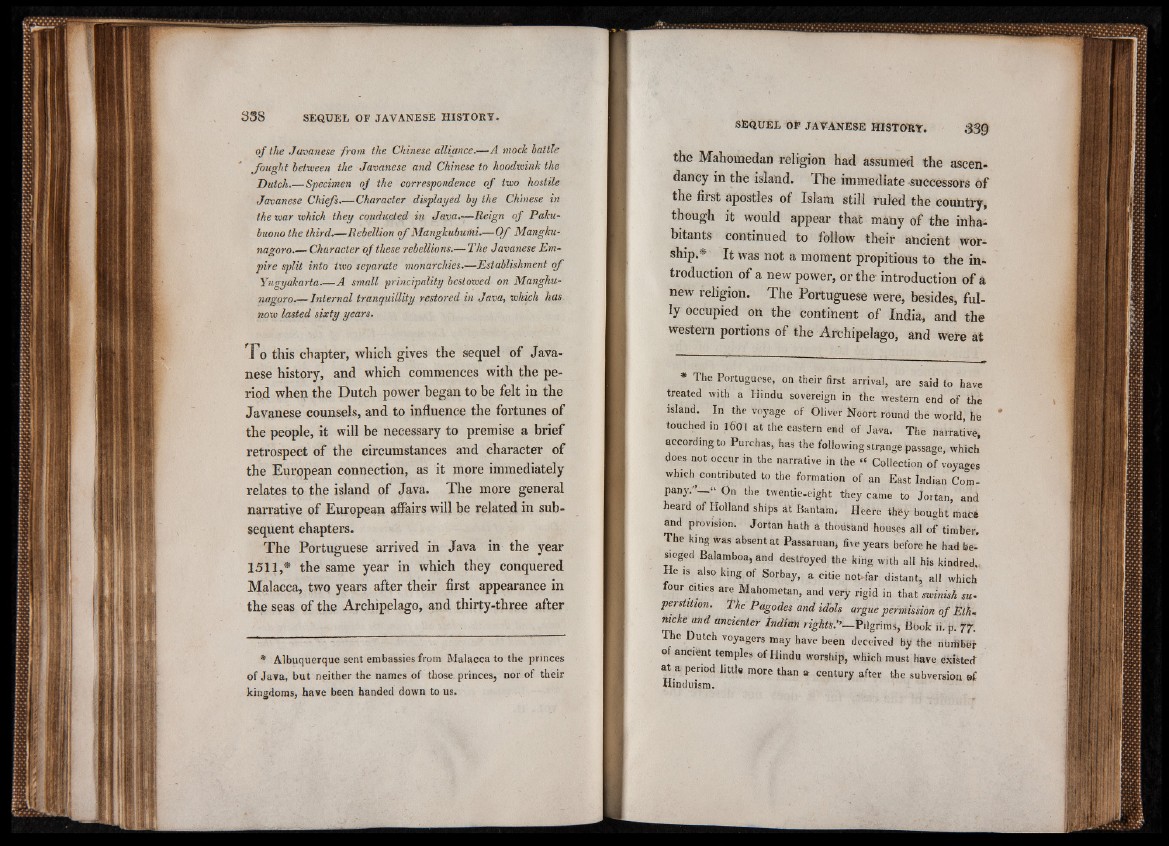
of the Javanese from the Chinese alliance.— A mock battle
fought between the Javanese and Chinese to hoodwink the
Dutch.— Specimen of the correspondence of two hostile
Javanese Chiefs.— Character displayed by the Chinese in
the war which they conducted in Java.-—Reign of Paku-
buono the third.— Rebellion of Mangkuburtii.— O f Mangku-
nagoro.— Character of these rebellions.— The Javanese Empire
split into two separate monarchies.—Establishment of
Yugyakarta.— A small principality bestowed on Manghu-
nagoro.— Internal tranquillity restored in Java, which has
now lasted sixty years.
T o this chapter, which gives the sequel of Javanese
history, and which commences with the period
when the Dutch power began to be felt in the
Javanese counsels, and to influence the fortunes of
the people, it will be necessary to premise a brief
retrospect of the circumstances and character of
the European connection, as it more immediately
relates to the island of Java. The more general
narrative of European affairs will be related in subsequent
chapters.
The Portuguese arrived in Java in the year
1511,* the same year in which they conquered
Malacca, two years after their first appearance in
the seas of the Archipelago, and thirty-three after
* Albuquerque sent embassies from Malacca to the princes
of Java, but neither the names of those princes, nor of their
kingdoms, have been handed down to us.
SEQUEL OF JAVANESE H ISTO EY . 339
the Mahoinedan religion had assumed the ascendancy
in the island. The immediate -successors of
the first apostles of Islam still ruled the country,
though it would appear that many of the inhabitants
continued to follow their ancient worship.*
It was not a moment propitious to the introduction
of a new power, or the introduction of a
new religion. The Portuguese were, besides, fully
occupied on the continent of India, and the
western portions of the Archipelago, and were at
* The Portuguese, on their first arrival, are said to have
treated with a Hindu sovereign in the western end of the
island. In the voyage of Oliver Noort round thé world, he
touched in 3 601 at the eastern end of Java. The narrative,
according to Purchas, has the following strange passage, which
does not occur in the narrative in the “ Collection of voyages
which contributed to the formation of an East Indian Company.”—“
On the twentie-eight they came to Jot tan, and
heard of Holland ships at Bantam, Heere they bought macé
and provision, Jortan hath a thousand housés all of timber.
The king was absent at Passaruan, five years before he had besieged
Balamboa, and destroyed the king with all his kindred.,
He is also king of Sorbay, a citie notnfar distant, all which
our cities are Mahometan, and very rigid in that swinish superstition.
The Pagodes and idols argue permission of Elh-
incke and ancienter Indian rights.''—P.lgrims, Bbok ii. p. 7 7 .
The Dutch voyagers may have been deceived by the nhiflbhr
of ancient temples of Hindu worship, which must have existed
at a period little more than a century after the subversion ©f
■Hinduism.